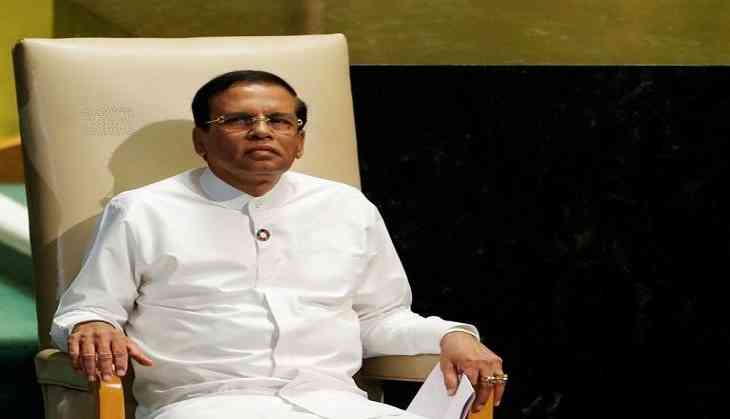Sri Lankan President Maithripala Sirisena vows never to reappoint Ranil Wickremesinghe as PM

Sri Lankan President Maithripala Sirisena on Sunday made it clear that he would never reappoint ousted prime minister Ranil Wickremesinghe even as he accepted that the action of removing his arch-rival has created "some form of political unrest" in the country.
Sirisena last month abruptly sacked Wickeremesinghe and replaced him with former strongman Mahinda Rajapksa in a controversial move termed by many as unconstitutional.
The controversial action on October 26 led to a political crisis in the country with both Wickremesinghe and Rajapaksa claiming to be the legitimate prime minister.
Sirisena, addressing the Colombo-based foreign correspondents, said: "There is no possibility that I will be re-appointing him (Wickeremesinghe).
"There is some form of political unrest in the country due to my decision, but I do not consider it as a serious political crisis".
The President said that he and Wickremesinghe had developed serious policy differences on their approach to governance.
"The first one was on the appointment of the Cabinet. I had entrusted a committee of academics to recommend ways to appoint a cabinet based on a scientific division of subjects. But Mr Wickremesinghe ignored those recommendations," he said.
Sirisena said that Wickremesinghe appointed one ministry to handle both the higher education and the highways.
One of the major issues of conflict was Sirisena's opposition to Wickremesinghe's nominee to the post of Central Bank governor Arjuna Mahendran, a Singaporean national.
"I told him (Wickremesinghe) that he should not be appointed because he is a non Sri Lankan. He insisted that he (Mahendran) be appointed," Sirisena said.
The President said that Mahendran was responsible for the biggest financial scam in the country over the Central Bank's issuance of bonds.
A probe had found Mahendran guilty of providing insider information to a dealer linked to his son-in-law.
"He (Mahendran) is absconding and Ranil Wickremesinghe knows his whereabouts," Sirisena said, adding that he would appoint a special probe on Wickremesinghe's three years as prime minister, accusing his government of being corrupt.
The President described Wickremesinghe as a proponent of destructive neo-Liberal economic policies which are not suitable for Sri Lanka.
"How can I work with a government leader who was ridiculing an attempt on my life," Sirisena said, accusing the ousted prime minister of trying to undermine a probe on an alleged plot to assassinate him.
An Indian national and a senior police officer are currently under the police custody for the plot.
Sirisena claimed that Wickremesinghe's sacking, Rajapaksa's appointment and Parliament's dissolution for fresh elections were all constitutional actions.
"They (the Opposition parties) have only challenged my decision to dissolve Parliament," he said.
Sirisena accused Speaker Karu Jayasuriya of violating Parliament's standing orders in approving the motion of no confidence against Rajapaksa.
He said although the standing orders can be suspended, Jayasuriya's action to approve the motion on the strength of voice was wrong in a matter of changing of a government.
Wickremesinghe has termed his dismissal as invalid and said he still holds a majority in the 225-member Parliament.
Former president Rajapaksa, who ruled Sri Lanka for nearly a decade, was unexpectedly defeated by his deputy, Sirisena, in the presidential election in January, 2015 with the support from Wickremesinghe's United National Party.
However, the power-sharing arrangement between Sirisena and Wickremesinghe became increasingly tenuous on several policy matters, mainly on economy and security.
The country is witnessing a political stalemate since Sirisena sacked Wickremesinghe on October 26.
Sirisena later dissolved Parliament, almost 20 months before its term was to end, and ordered snap election. The Supreme Court overturned Sirisena's decision to dissolve Parliament and halted the preparations for snap polls.
Speaker Jayasuriya then ordered a floor test in the 225-member assembly to end the ongoing political crisis, a move which invited the wrath of the government of Rajapaksa.
The United National Front led by Wickeremesinghe has already moved three motions of no trust against Rajapaksa. Rajapaksa, however, has refused to step down.
-PTI

